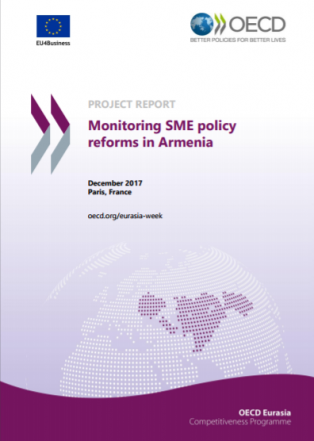
Policies to support the development of small and medium-sized enterprises (SMEs) have recently improved in Armenia, but key challenges remain and pose obstacles for the development and internationalisation of SMEs, an OECD report on ‘Monitoring SME policy reforms in Armenia’, produced under the EU4Business initiative, has found.
The report was produced as part of the Supporting SME Competitiveness Reforms in the Eastern Partner countries programme, implemented by the OECD under the EU4Business initiative. It focuses on two relevant areas for the internationalisation of SMEs: connecting Armenian SMEs to global value chains in the agribusiness sector, and linking SMEs with multinational enterprises in the construction materials sector.
The OECD report finds that since 2014, the total value of exports of Armenian goods has been growing by roughly 15% per year, but export levels still lag behind the regional average for Eastern partner (EaP) countries. “The production and processing of higher-value products would help to diversify Armenia’s export basket and help local companies move up in global value chains,” the OECD recommends.
Foreign direct investment
At the same time, net foreign direct investment inflows have continued their downward trend, dropping from 8.1% of GDP in 2008 to just 1.7% in 2015. But the government is increasingly engaged in reforms to attract investment and in 2015 created a dedicated new government agency, the Development Foundation Armenia (DFA), to attract foreign investors.
Indeed, following the 2014 OECD recommendations, Armenia has undertaken a number of important reforms to help domestic SMEs internationalise and link with multinational enterprises, the report says.
The OECD says that SMEs constitute 98% of all registered and functioning legal entities in Armenia, while within the SME sector, micro-enterprises make up 89% of all registered businesses. “Given the large share of micro-enterprises among Armenian SMEs, policies need to first help them to grow through upgrading their production, and second to overcome the lack of capacity and resources that hinders them from internationalising,” the OECD says.
Policies for SME development
The report acknowledges that policies to support SME development have improved, adding that the government has engaged in a continuous effort to implement business environment reforms, simplify the legislative and regulatory framework and enhance its business support infrastructure.
“However, key challenges remain unaddressed and pose obstacles for the development and internationalisation of SMEs.” Despite a strong government focus on export-led growth, SME internationalisation in Armenia remains limited when compared to other countries in the Eastern Partnership: only 6.9% of small and 7.7% of medium-sized enterprises export directly or indirectly, compared to the regional average of 15% of small enterprises and 25.6% of medium-sized enterprises. “There is a need to design targeted policies, and implement support programmes, to facilitate Armenian SMEs’ participation in global value chains and strengthen their linkages with foreign investors,” the OECD says.
Agribusiness and construction materials
Back in 2014, the OECD identified two areas as priority policy reforms for fostering SME development:
- connecting Armenian SMEs to global value chains in the agribusiness sector
- linking SMEs with multinational enterprises in the construction materials sector.
The main identified challenges were a lack of export promotion tools, limited export-related infrastructure, low provision of export finance, untapped opportunities for foreign investors and weak SME capabilities.
Looking back at the two sectors in detail, the OECD says modest progress has been registered on export promotion and export-related infrastructure for agribusiness, while the provision of export finance in the sector has been significantly improved.
For construction materials, important steps to trigger local demand have been taken. However, efforts to improve investment promotion have not yet translated into tangible results and investment projects, the OECD report says.
Funded by the EU under its EU4Business initiative, the project to support SME competitiveness reforms assists Eastern Partnership countries in the implementation of policy reforms based on policy recommendations from the OECD’s Small and Medium-sized Enterprises (SME) Policy Index, contributing to improved government responsiveness to SME needs and requests, and to improved public-private dialogue at national level.
